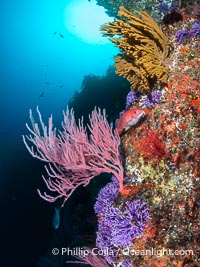
Red gorgonian Leptogorgia chilensis, purple hydrocoral Stylaster californicus, and yellow zoanthid anemone Epizoanthus giveni, at Farnsworth Banks, Catalina Island.
Location: Catalina Island, California
Image ID: 39540
Location: Catalina Island, California
Image ID: 39540
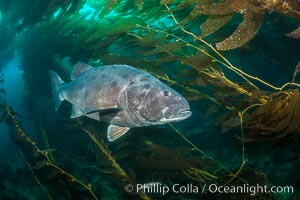
Giant Black Sea Bass with Unique Pattern of Black Spots at Catalina Island. The giant sea bass is an endangered species reaching up to 8' in length and 500 lbs, amid giant kelp forest.
Species: Giant black sea bass, Stereolepis gigas
Location: Catalina Island, California
Image ID: 33356
Species: Giant black sea bass, Stereolepis gigas
Location: Catalina Island, California
Image ID: 33356
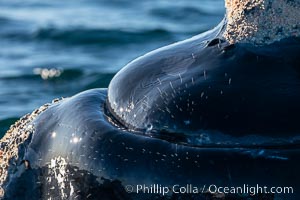
Whale hair on the rostrum and chin of a southern right whale, sidelit by the setting sun. These individual hairs provide sensor information to the whale as it swims through ocean currents or touches the ocean bottom.
Species: Southern Right Whale, Eubalaena australis
Location: Puerto Piramides, Chubut, Argentina
Image ID: 38331
Species: Southern Right Whale, Eubalaena australis
Location: Puerto Piramides, Chubut, Argentina
Image ID: 38331
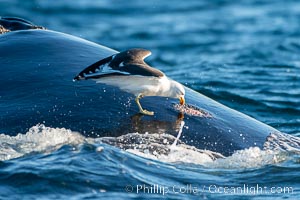
Seagull picks skin off a southern right whale, leaving a lesion that may become infected and which scientists have shown to be stressful to young calves.
Species: Southern Right Whale, Eubalaena australis
Location: Puerto Piramides, Chubut, Argentina
Image ID: 38333
Species: Southern Right Whale, Eubalaena australis
Location: Puerto Piramides, Chubut, Argentina
Image ID: 38333
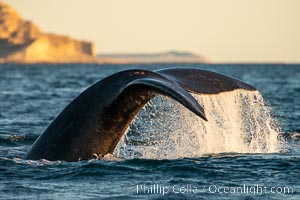
Southern right whale raises its fluke tail out of the water prior to diving.
Species: Southern Right Whale, Eubalaena australis
Location: Puerto Piramides, Chubut, Argentina
Image ID: 38337
Species: Southern Right Whale, Eubalaena australis
Location: Puerto Piramides, Chubut, Argentina
Image ID: 38337
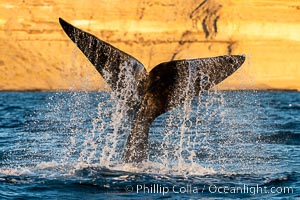
Southern right whale fluke raised out of the water, tail slapping.
Species: Southern Right Whale, Eubalaena australis
Location: Puerto Piramides, Chubut, Argentina
Image ID: 38339
Species: Southern Right Whale, Eubalaena australis
Location: Puerto Piramides, Chubut, Argentina
Image ID: 38339
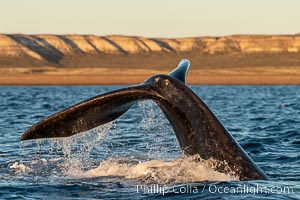
Southern right whale raises its fluke tail out of the water prior to diving.
Species: Southern Right Whale, Eubalaena australis
Location: Puerto Piramides, Chubut, Argentina
Image ID: 38341
Species: Southern Right Whale, Eubalaena australis
Location: Puerto Piramides, Chubut, Argentina
Image ID: 38341
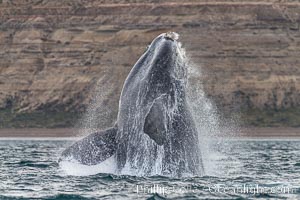
Breaching southern right whale, Eubalaena australis, Patagonia.
Species: Southern Right Whale, Eubalaena australis
Location: Puerto Piramides, Chubut, Argentina
Image ID: 38405
Species: Southern Right Whale, Eubalaena australis
Location: Puerto Piramides, Chubut, Argentina
Image ID: 38405
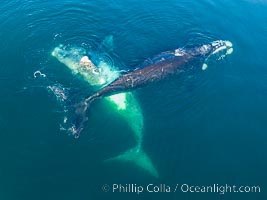
Courting group of southern right whales, aerial photo. Mating may occur as a result of this courting and social behavior. The white whale seen here is a serious player named El Copulador (the copulator) and is often seen in mating and courting groups of southern right whales at Peninsula Valdes. His light coloration is an indication that he was a white calf, but he did not darken as he aged in the way most white southern right whale calves do.
Species: Southern Right Whale, Eubalaena australis
Location: Puerto Piramides, Chubut, Argentina
Image ID: 38357
Species: Southern Right Whale, Eubalaena australis
Location: Puerto Piramides, Chubut, Argentina
Image ID: 38357
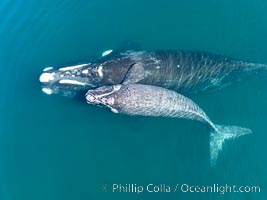
Southern right whale mother and calf, aerial photo, Eubalaena australis.
Species: Southern Right Whale, Eubalaena australis
Location: Puerto Piramides, Chubut, Argentina
Image ID: 38385
Species: Southern Right Whale, Eubalaena australis
Location: Puerto Piramides, Chubut, Argentina
Image ID: 38385
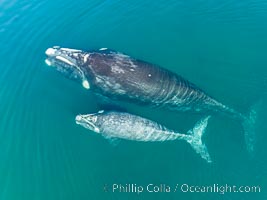
Southern right whale mother and calf, aerial photo, Eubalaena australis.
Species: Southern Right Whale, Eubalaena australis
Location: Puerto Piramides, Chubut, Argentina
Image ID: 38386
Species: Southern Right Whale, Eubalaena australis
Location: Puerto Piramides, Chubut, Argentina
Image ID: 38386
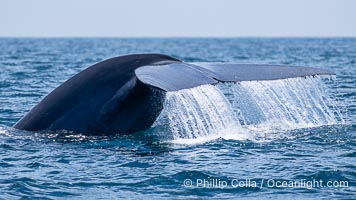
Blue whale, raising fluke prior to diving for food, fluking up, lifting tail as it swims in the open ocean foraging for food.
Species: Blue whale, Balaenoptera musculus
Location: San Diego, California
Image ID: 40608
Species: Blue whale, Balaenoptera musculus
Location: San Diego, California
Image ID: 40608
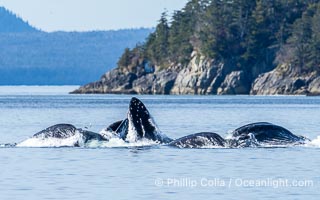
Humpback whales bubblenet feeding in Southeast Alaska. Coordinated bubble-net feeding is a specialized cooperative feeding technique used by humpback whales, where a group of whales works together to trap fish or krill in a net of bubbles then lunge through to feed.
Species: Humpback whale, Megaptera novaeangliae
Location: Sitka Sound, Alaska
Image ID: 40922
Species: Humpback whale, Megaptera novaeangliae
Location: Sitka Sound, Alaska
Image ID: 40922
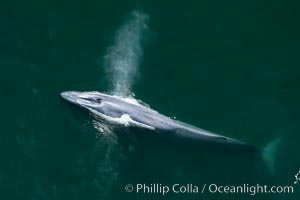
Blue whale, exhaling as it surfaces from a dive, aerial photo. The blue whale is the largest animal ever to have lived on Earth, exceeding 100' in length and 200 tons in weight.
Species: Blue whale, Balaenoptera musculus
Location: Redondo Beach, California
Image ID: 25951
Species: Blue whale, Balaenoptera musculus
Location: Redondo Beach, California
Image ID: 25951
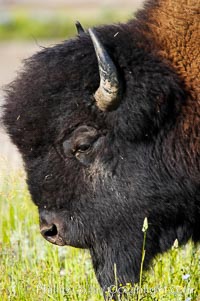
The bisons massive head is its most characteristic feature. Its forehead bulges because of its convex-shaped frontal bone. Its shoulder hump, dwindling bowlike to the haunches, is supported by unusually long spinal vertebrae. Over powerful neck and shoulder muscles grows a great shaggy coat of curly brown fur, and over the head, like an immense hood, grows a shock of black hair. Its forequarters are higher and much heavier than its haunches. A mature bull stands about 6 1/2 feet (2 meters) at the shoulder and weighs more than 2,000 pounds (900 kilograms). The bisons horns are short and black. In the male they are thick at the base and taper abruptly to sharp points as they curve outward and upward; the females horns are more slender.
Species: American bison, Bison bison
Location: Yellowstone National Park, Wyoming
Image ID: 13120
Species: American bison, Bison bison
Location: Yellowstone National Park, Wyoming
Image ID: 13120
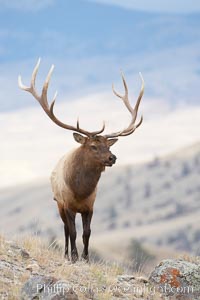
Elk, bull elk, adult male elk with large set of antlers. By September, this bull elk's antlers have reached their full size and the velvet has fallen off. This bull elk has sparred with other bulls for access to herds of females in estrous and ready to mate.
Species: Elk, Cervus canadensis
Location: Mammoth Hot Springs, Yellowstone National Park, Wyoming
Image ID: 19721
Species: Elk, Cervus canadensis
Location: Mammoth Hot Springs, Yellowstone National Park, Wyoming
Image ID: 19721

Panorama of the Wave. The Wave is a sweeping, dramatic display of eroded sandstone, forged by eons of water and wind erosion, laying bare striations formed from compacted sand dunes over millenia. This panoramic picture is formed from thirteen individual photographs.
Location: North Coyote Buttes, Paria Canyon-Vermilion Cliffs Wilderness, Arizona
Image ID: 20700
Panorama dimensions: 4661 x 25458
Location: North Coyote Buttes, Paria Canyon-Vermilion Cliffs Wilderness, Arizona
Image ID: 20700
Panorama dimensions: 4661 x 25458
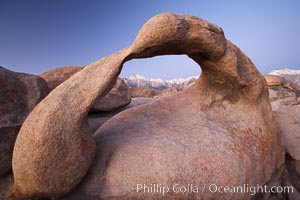
Mobius Arch at sunrise, with Mount Whitney (the tallest peak in the continental United States), Lone Pine Peak and snow-covered Sierra Nevada Range framed within the arch. Mobius Arch is a 17-foot-wide natural rock arch in the scenic Alabama Hills Recreational Area near Lone Pine, California.
Location: Alabama Hills Recreational Area, California
Image ID: 21729
Location: Alabama Hills Recreational Area, California
Image ID: 21729
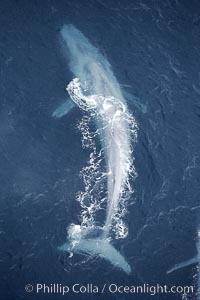
Blue whale. The entire body of a huge blue whale is seen in this image, illustrating its hydronamic and efficient shape.
Species: Blue whale, Balaenoptera musculus
Location: La Jolla, California
Image ID: 21251
Species: Blue whale, Balaenoptera musculus
Location: La Jolla, California
Image ID: 21251
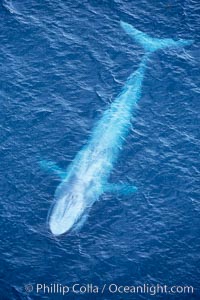
Blue whale. The entire body of a huge blue whale is seen in this image, illustrating its hydronamic and efficient shape.
Species: Blue whale, Balaenoptera musculus
Location: La Jolla, California
Image ID: 21252
Species: Blue whale, Balaenoptera musculus
Location: La Jolla, California
Image ID: 21252
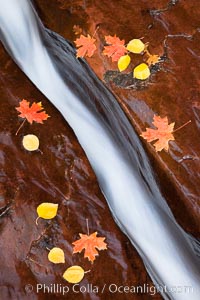
Water rushes through a narrow crack, in the red sandstone of Zion National Park, with fallen autumn leaves.
Location: Zion National Park, Utah
Image ID: 26100
Location: Zion National Park, Utah
Image ID: 26100
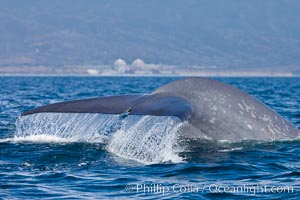
Blue whale and San Onofre Nuclear Power generating station, raising fluke prior to diving for food, fluking up, lifting its tail as it swims in the open ocean foraging for food.
Species: Blue whale, Balaenoptera musculus
Location: Dana Point, California
Image ID: 27337
Species: Blue whale, Balaenoptera musculus
Location: Dana Point, California
Image ID: 27337
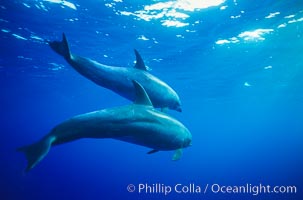
Pacific bottlenose dolphin swimming offshore of Guadalupe Island, Mexico.
Species: Bottlenose dolphin, Tursiops truncatus
Location: Guadalupe Island (Isla Guadalupe), Baja California, Mexico
Image ID: 00968
Species: Bottlenose dolphin, Tursiops truncatus
Location: Guadalupe Island (Isla Guadalupe), Baja California, Mexico
Image ID: 00968
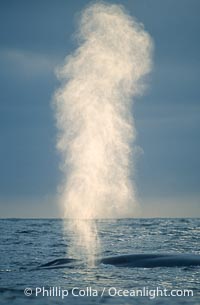
A blue whale spouts at sunset. The blow, or spout, of a blue whale can reach 30 feet into the air. The blue whale is the largest animal ever to live on earth.
Species: Blue whale, Balaenoptera musculus
Image ID: 02217
Species: Blue whale, Balaenoptera musculus
Image ID: 02217
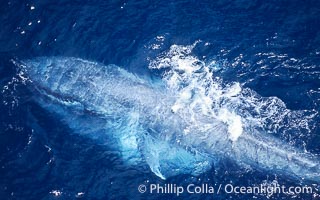
A blue whale eating krill. This blue whale is seen feeding and surfacing amid krill with its throat fully engorged with krill and water. It will push the water back out with its tongue, trapping the krill in its baleen which acts like a filter. Aerial photo, Baja California.
Species: Blue whale, Balaenoptera musculus
Image ID: 05837
Species: Blue whale, Balaenoptera musculus
Image ID: 05837
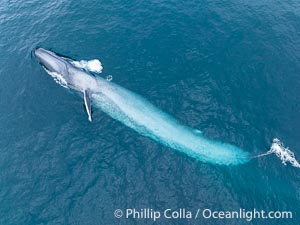
Aerial photo of blue whale near San Diego as it swims on its side turning and blows a bubble of air out of its blowhole. This enormous blue whale glides at the surface of the ocean, resting and breathing before it dives to feed on subsurface krill.
Species: Blue whale, Balaenoptera musculus
Location: San Diego, California
Image ID: 39427
Species: Blue whale, Balaenoptera musculus
Location: San Diego, California
Image ID: 39427
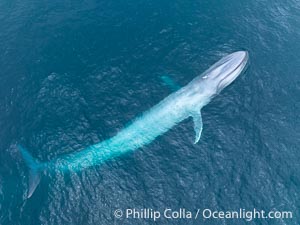
Aerial photo of blue whale near San Diego. This enormous blue whale glides at the surface of the ocean, resting and breathing before it dives to feed on subsurface krill.
Species: Blue whale, Balaenoptera musculus
Location: San Diego, California
Image ID: 39428
Species: Blue whale, Balaenoptera musculus
Location: San Diego, California
Image ID: 39428
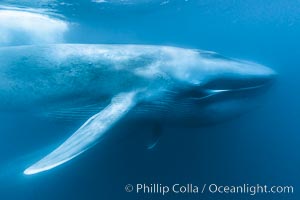
Blue whale underwater with mouth full of krill, calf is partially seen below the mother. This incredible picture of a blue whale, the largest animal ever to inhabit earth, shows it swimming through the open ocean, a rare underwater view. Over 80' long and just a few feet from the camera, an extremely wide lens was used to photograph the entire enormous whale.
Species: Blue whale, Balaenoptera musculus
Location: California
Image ID: 27317
Species: Blue whale, Balaenoptera musculus
Location: California
Image ID: 27317
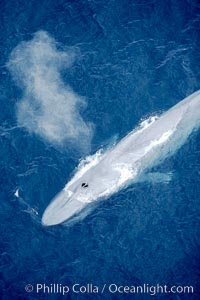
Blue whale, exhaling in a huge blow as it swims at the surface between deep dives. The blue whale's blow is a combination of water spray from around its blowhole and condensation from its warm breath.
Species: Blue whale, Balaenoptera musculus
Location: La Jolla, California
Image ID: 21253
Species: Blue whale, Balaenoptera musculus
Location: La Jolla, California
Image ID: 21253
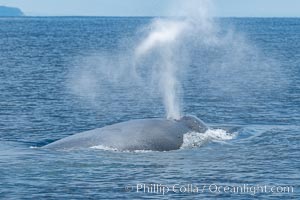
Blue whale, exhaling in a huge blow as it swims at the surface between deep dives. The blue whale's blow is a combination of water spray from around its blowhole and condensation from its warm breath.
Species: Blue whale, Balaenoptera musculus
Location: San Diego, California
Image ID: 34560
Species: Blue whale, Balaenoptera musculus
Location: San Diego, California
Image ID: 34560